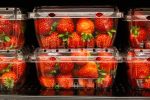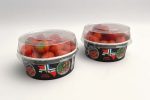
Retail packaging for produce
Part 1 of 3: To what extent is sustainable packaging important for consumers?
To what extent is sustainability and sustainable packaging truly important for consumers? Do consumers actually follow through on what they claim to purchase? What do consumers name as being important, and how do they act in a simulated purchasing situation?
In order to answer these questions, NNZ, market leader in vegetable and fruit packaging, recently conducted a large-scale survey in Germany (more than 300 interviews and 11,700 purchasing stimulations). NNZ conducted the survey for packaging materials for blueberries and strawberries. The summary of the results were presented at the European Packaging Forum in Düsseldorf.
‘Our survey is an absolute must-read for retailers, growers and suppliers engaged in the soft fruit sector’, says Alies Padding, Innovation Manager at NNZ, the packaging network. ‘It provides insight into the associations and purchasing criteria for packaged soft fruit, and it will not come as a surprise: consumers do not actually buy what they claim to buy! Also clear is that consumers refer to sustainability of plastics, cardboard and pulp packaging options with great emotion but little knowledge. Consumers have little knowledge or association with the environmental hallmarks on the packaging. During the survey, many people expressed a desire for clear explanation of the appropriate waste flows for the packaging. This is an opportunity for the branch to contribute to our joint targets of 100% recycling of packaging in the near future.
Above all, it became clear that consumers care most about the quality of the soft fruit, and that all other criteria are subordinate to this. And as we all know, the primary function of the packaging is to protect the quality and to prevent food wastage in the supply chain, respectively. The survey predicts the percentage of consumers that will choose a certain type of pulp, cardboard or plastic packaging, and why’. NNZ will be publishing the results in 3 blogs.
In this first part, we discuss the results of consumer views of sustainability and sustainable packaging, based on the following questions:
The concepts concerned in sustainability, such as “carbon footprint” and “biodegradable” are not fully understood. And when it comes to the sustainability of packaging materials, respondents are relatively confident in terms of their knowledge of sustainability of cardboard packaging. In reality, they actually know very little. When it comes to plasticEnvironmental hallmarks, what do consumers know and understand in that sense? packaging materials, respondents are less confident regarding their knowledge of sustainability, and comments tend to be limited to: “causes too much plastic waste” and “harmful for the environment”.
To summarise, consumers are poorly informed when it comes to sustainability in general and the sustainability of the various packaging materials. There is plenty of ground to be won here for the branch and the political sector, therefore.
Of the hallmarks provided in the survey, German consumers were only aware of the numbers 4 and 13 below. Generally speaking therefore, we can assume that these environmental hallmarks have little influence on purchasing behaviour. However, 90% of the consumers say that they would appreciate a simple explanation on the packaging, in order to be able to separate waste packaging materials effectively. NNZ is looking forward to discussing this with branch colleagues and retailers.
In the next blog , we reveal the emotional and rational criteria that influence purchasing decisions when it comes to packaged soft fruit.
"*" indicates required fields
These cookies are used to optimize performance and functionality of the website. These cookies are not essential when browsing the website. However it is possible certain elements on the website will not function properly without the cookies.
These cookies collect data that we use to understand how our website is used and perceived. These cookies also help us to optimize the website for the best user experience.
These cookies allow ad-networks to monitor your online behaviour so they can display relevant ads based on your interest and online behaviour. These cookies also prevent the same ads from being displayed over and over.









